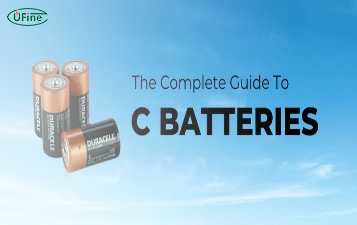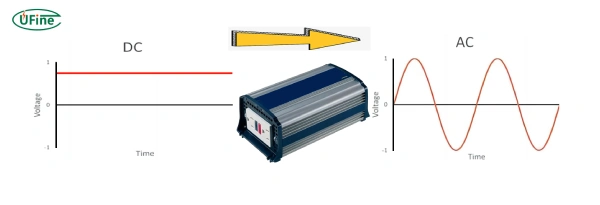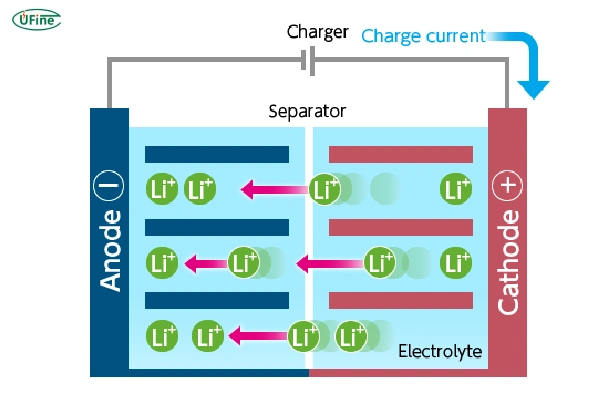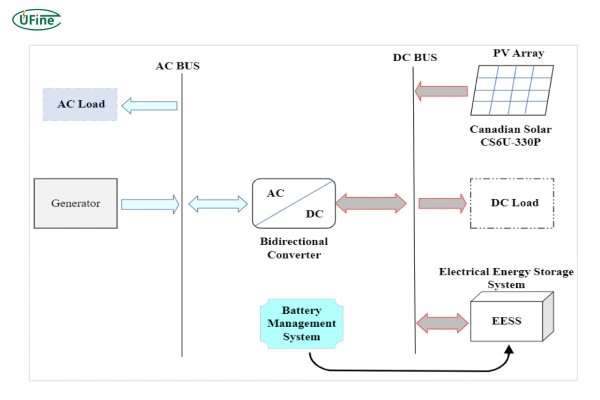
- Part 1. Why it matters
- Part 2. What’s the difference between AC and DC power?
- Part 3. Why are lithium batteries DC?
- Part 4. So why do some devices use AC?
- Part 5. Can lithium batteries provide AC?
- Part 6. Why DC power is ideal for lithium battery applications
- Part 7. Ufine Battery insight: why DC quality matters
- Part 8. AC vs. DC safety considerations
- Part 9. Common misunderstandings about AC and DC in batteries
- Part 10. How to choose the right power output for your needs
- Part 11. Final thoughts
- Part 12. FAQ
Part 1. Why it matters
When people search for “battery AC or DC,” they’re often driven by genuine curiosity and confusion. With AC powering our homes and DC charging our phones and laptops, it’s natural to wonder: what kind of electricity does a lithium battery provide? The clear answer is this: lithium batteries supply DC (Direct Current).
But that’s just the beginning. Understanding this concept can help you make smarter choices about devices, power systems, and even safety. This article dives deep into the topic—combining practical applications, real-world scenarios, and expert knowledge to help you grasp the true nature of lithium battery output.
Part 2. What’s the difference between AC and DC power?
Let’s start with the fundamentals.
- Direct Current (DC) flows in a single, constant direction. It’s predictable, steady, and essential for most electronics. Every battery in existence, including lithium ones, produces DC.
- Alternating Current (AC), on the other hand, reverses direction many times per second—typically 50 or 60 hertz. This type of current is what flows through your household outlets.
An easy analogy? DC is like water flowing in one direction through a hose. AC is more like water sloshing back and forth rapidly.
Part 3. Why are lithium batteries DC?
Understanding the inner workings of lithium batteries is key to understanding why they produce DC. Inside a lithium battery, there are three main components:
- Anode (negative terminal)
- Cathode (positive terminal)
- Electrolyte (medium through which ions move)
Learn About the Cathode and Anode of the Battery
When the battery discharges, lithium ions move from the anode to the cathode, releasing energy. This process produces a flow of electrons in one direction—this is what we call direct current.
There’s no alternating flow here. Everything inside the battery chemistry is designed to drive current in a single, unidirectional path. That’s why lithium batteries are inherently DC devices.
Part 4. So why do some devices use AC?
The confusion often stems from our everyday use of household appliances. Refrigerators, TVs, air conditioners—all run on AC. Why?
Because AC is easier to transmit over long distances and can be stepped up or down in voltage using transformers. That’s why electrical grids use AC.
However, many modern devices, even those that plug into the wall, internally convert AC to DC before it reaches the actual electronics. Your phone charger, for instance, converts AC to DC before charging your lithium battery.
Part 5. Can lithium batteries provide AC?
Not directly. However, lithium batteries can indirectly power AC devices through a component called an inverter.
An inverter takes the DC power from the battery and converts it to AC, allowing you to use conventional devices. This is common in:
- Solar energy systems
- Backup power supplies
- Electric vehicles with AC drive motors
- Portable power stations
That said, conversion comes at a cost—a small percentage of energy is lost during DC-to-AC inversion.
Part 6. Why DC power is ideal for lithium battery applications
There’s a good reason lithium batteries are used in so many modern devices:
- Smartphones and tablets
- Electric scooters and e-bikes
- Drones and RC vehicles
- Medical equipment and portable tools
These products demand consistent, reliable, and efficient energy delivery—and DC is perfect for that. There’s no need to oscillate current back and forth. You get a clean, stable energy supply that modern electronics can manage efficiently.
Moreover, lithium batteries are paired with Battery Management Systems (BMS) to regulate output, protect against overcharging or deep discharge, and ensure the safety of your devices.
Part 7. Ufine Battery insight: why DC quality matters
At the heart of every high-performance lithium battery is precise, reliable DC output. This is where Ufine Battery excels.
Ufine Battery is a trusted Chinese custom lithium battery manufacturer. We provide a wide range of products:
- Lithium polymer batteries (LiPo)
- LiFePO4 batteries for high-stability applications
- 18650 and cylindrical cells for portable power
- Ultra-thin batteries for wearable and compact electronics
- High-rate and high-temperature batteries for demanding environments
Whether your project requires a specific voltage, capacity, form factor, or temperature rating, Ufine Battery delivers custom-engineered solutions designed for real-world performance and safety.
Reach out to us to get your project powered the right way.
Part 8. AC vs. DC safety considerations
There’s a common myth that DC is always safer than AC. That’s not entirely true—it depends on voltage, current, and the use case.
- High-voltage DC can be dangerous. Because the current is continuous, it can cause more severe burns and muscle contractions.
- AC can interfere with your heartbeat more easily, especially at household voltages.
However, in most battery-operated electronics, the voltage is low and the power is well-regulated. Thanks to modern protection circuits, lithium batteries today are safer than ever—as long as you use quality cells, like those offered by Ufine Battery.
Part 9. Common misunderstandings about AC and DC in batteries
Many people misinterpret how battery systems work. Let’s clear up some misconceptions:
- “My battery plugs into the wall, so it must be AC.” → Incorrect. The wall provides AC, but the charger converts it to DC before charging the battery.
- “This power bank has an AC outlet, so it must be AC-powered.” → Again, no. The battery inside is DC. An inverter converts the output to AC for your convenience.
- “You need AC to run powerful devices.” → Only partially true. With the right inverter, lithium DC batteries can power high-wattage AC devices.
Part 10. How to choose the right power output for your needs
When designing a system or choosing a power source, you need to ask:
- Does your device require AC or DC?
- If AC, do you have an inverter that can handle your wattage needs?
- Is the battery capacity sufficient for your usage time?
- Do you need special characteristics—like high-temperature resistance or ultra-thin dimensions?
That’s where Ufine Battery’s customization services become invaluable. Whether you’re an engineer designing a product or a startup building a prototype, we can help you select or build the right lithium battery with the appropriate DC characteristics—and guidance on AC conversion if needed.
Part 11. Final thoughts
At the end of the day, lithium batteries are DC powerhouses. Their internal chemistry naturally produces direct current, making them perfect for modern electronics, EVs, and renewable energy systems.
And while AC has its place, especially in grid and household infrastructure, lithium batteries and DC go hand in hand.
If your project demands reliability, customization, and technical excellence, don’t settle for generic battery packs. Choose Ufine Battery, your trusted partner in custom lithium solutions.
Part 12. FAQ
Are all batteries DC or only lithium ones?
All batteries—including alkaline, NiMH, and lithium—provide DC by nature.
Can I plug an AC device into a lithium battery?
Only if you use an inverter that converts DC to AC.
Why do solar power systems use DC batteries?
Solar panels produce DC, so pairing them with DC batteries minimizes conversion losses.
Can lithium batteries be charged directly from an AC source?
No. They must first go through a charger that converts AC to DC.
Related Tags:
More Articles

The Ultimate Guide to C Type Battery
What is a C type battery? Discover sizes, types (alkaline/NiMH/lithium), vs AA/D batteries, top uses, and where to buy the best C batteries for your devices.
4.0Ah vs. 2.0Ah Battery: Key Differences and Which is Best for Your Projects
Compare 2Ah vs 4Ah batteries: meaning, runtime, weight, and best tool uses. Learn if 4.0Ah is worth it for your cordless tools and DIY projects.
The Ultimate Guide to Battery Posts and Battery Terminals
Explore battery terminal types, maintenance tips, and troubleshooting. Learn how to clean corrosion, identify positive/negative terminals, and prevent issues.
Top 5 Best 3V Lithium Batteries in 2025
Discover the best 3V lithium batteries for 2025. Compare CR2032, CR123A, CR2, CR2025 specifications, runtime, and ideal applications.
The Ultimate Guide to 24V Power Wheels Battery
Discover the best 24V Power Wheels battery for kids’ vehicles. Learn features, benefits, charging tips, and how to extend battery life for hours of fun.





